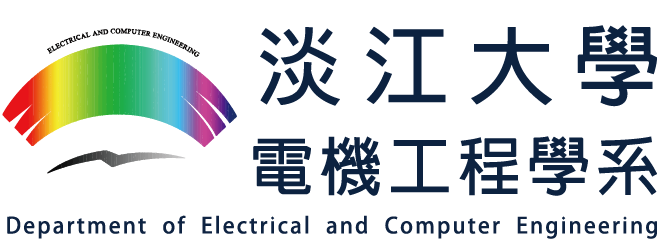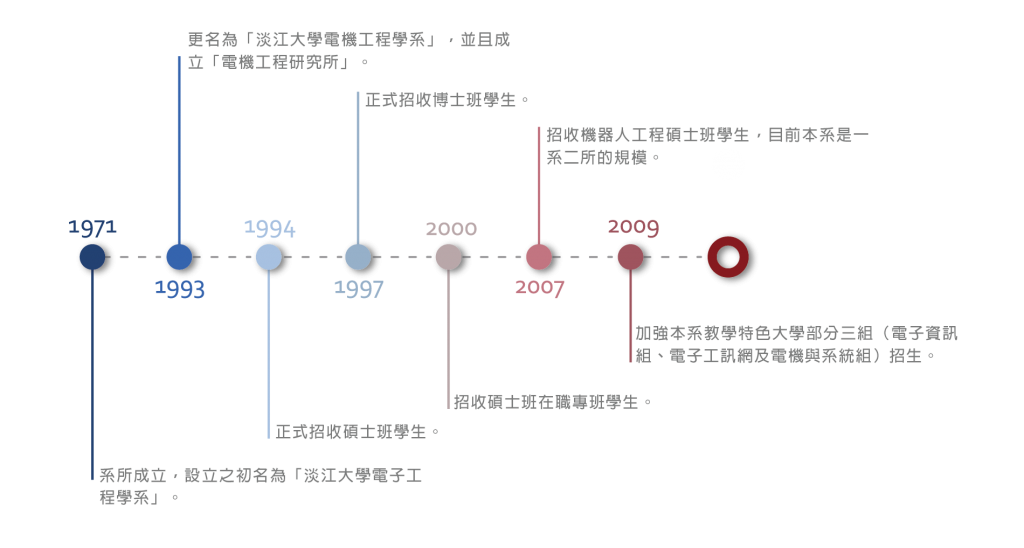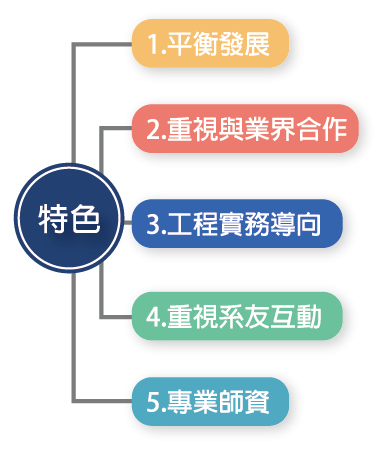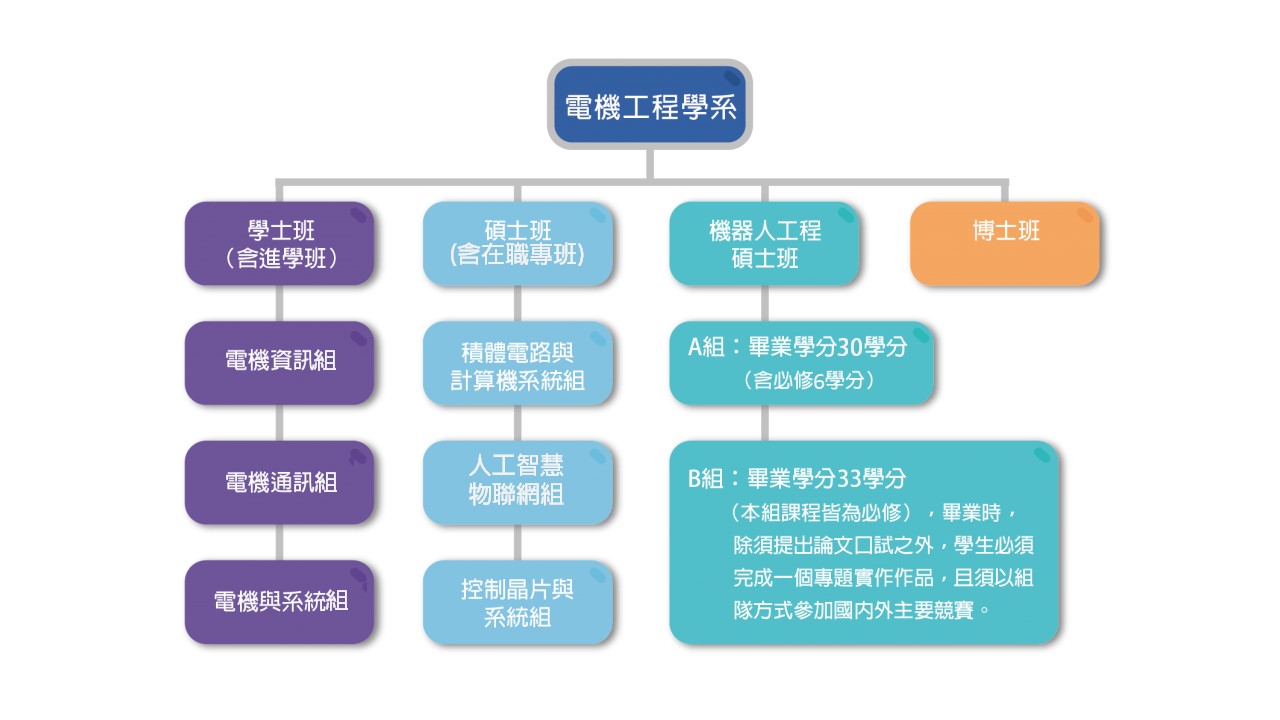系所簡介
歷史沿革
The Electrical and Computer Engineering (ECE) Department is one of the biggest departments among Tamkang University. The Department was established in 1971; originally it was named as the Electronic Engineering (EE) Department. Tamkang University is one of the best and renowned private Universities and has been elected as the most favourite college evaluated by the 1000 large enterprises based on the students graduated. Our department was renamed in 1993 as the Electrical Engineering Department, at the same time we established the MASTER OF ENGINEERING IN ELECTRICAL ENGINEERING. In 1997, doctoral students were enrolled and MATER’S PROGRAM IN ROBOTICS ENGINEERING, DRPARTMENT OF ELECTRICAL ENGINEERING was established in 2006. The present name as the ECE department is starting in 2014. Currently, we have about seven thousand students graduated called to the beginning of this department being set up. It offers four-year programs leading to the Bachelor of Engineering degree in Computer Engineering, Electrical Engineering, and Communications Engineering. From administrative point of view this department is running with a Department and two graduates, included the 「Department of Electrical and Computer Engineering」, 「Master and PhD with the Department of Electrical and Computer Engineering 」,「Robotics Engineering Master Program」, respectively. The department compared to the general electrical engineering in history, has the scale there is a considerable competitive advantage and friendly.
The Department stressed on the internship and implementation. Each compulsory subject is scheduled practicum, practicum lessons are assistant counseling students. In addition to imparting theoretical knowledge, we pay more attention to the experience of actual operation and exercise each semester are planning experimental course to help students will learn the theory and practice, experiment and practical courses of each semester, all courses and theory complement each other, so that the students in hands-on process, to understand the essence of knowledge. The Department and in the third grade next semester and last semester in the fourth grade were set up thematic experimental courses, according to students interested in, select a topic, research by a professor in the guidance, and at the end of published research by students in order to cultivate the spirit of the students, lay the cornerstone of future employment or advanced studies. The field of electrical engineering covers a very wide range, so the four instructional grouping is based on the expertise of full-time teachers and curriculum communication, control, electronic circuits and computer hardware and other students in the University of Electrical Engineering has a breadth of learning. In addition, the industry demand, the Department and the Information Department of the Republic in 1996 and opened the embedded system credit programs, students have the opportunity to get degree certificates Program certificate, a competitive advantage in future employment.
Of each school system have passed the certification of the China Society for Engineering Education (IEET) “,” Engineering and Technology Education, on behalf of the educational goals and curriculum of the Department of Planning has reached international standards of Europe and the United States. We shall continue to uphold the concept of “continuous improvement” certification, the department’s teaching and research environment better, to welcome you (you) become a new member of the Department of Electrical and Computer Engineering of Tamkang University, and wish you enjoy your study and campus life with a full of substance and rewarding experience.
Educational philosophy
The scope of electrical engineering is very broad. It can range from communications, control, electronic circuits to computer hardware, etc. This department emphasizes strengthening research capabilities and fostering pragmatism. It features problem-solving abilities training which will prepare students to seize opportunities, adapt to meet the needs of the community, and work with the future engineering development flow after graduation. Therefore, curriculum planning not only focuses on theoretical courses, but also adheres to the direction of practice-oriented engineering training. The main purpose is to allow students to develop knowledge-seeking and problem-solving abilities to aid them in building all-around concepts in the design and research methodology. We aim to help students learn design methodology in order to develop the ability to problem-solve and design pragmatically. Through this program, students can apply systematic methodology, technical skills, models, and tools to solve problems.
Features
Balanced development of various areas of expertise.
Emphasis on cooperation with the industry. Actively seek joint education opportunities with the industry to enhance students’ competitiveness and employability. Focused on orientation of strengthening research skills and fostering pragmatic approaches. This direction is unique in its problem-solving ability training, to help students better take advantage of opportunities post graduation, adapt to the future needs of society, and work with the greater environment.
Lab courses are compulsory. Students are required to conduct hands-on experiments. They should not only focus on theoretical courses, but also cultivating technical skills that are industry-oriented. The primary purpose is to allow students to build up engineering knowledge and problem-solving abilities. It also aims to help students acquire design capabilities and establish research methodology. Through learning design methodology, it hopes to extend to fostering problem-solving abilities and pragmatic design skills to allow for students to utilize systematic methodology, technical skills, models, and tools to solve problems.
Promotes interaction with alumni and actively seeks partnership opportunities.
All full-time faculty members are dedicated to mentoring and counseling students.
- Features
- Balanced development of various areas of expertise.
- Emphasis on cooperation with the industry. Actively seek joint education opportunities with the industry to enhance students’ competitiveness and employability. Focused on orientation of strengthening research skills and fostering pragmatic approaches. This direction is unique in its problem-solving ability training, to help students better take advantage of opportunities post graduation, adapt to the future needs of society, and work with the greater environment.
- Lab courses are compulsory. Students are required to conduct hands-on experiments. They should not only focus on theoretical courses, but also cultivating technical skills that are industry-oriented. The primary purpose is to allow students to build up engineering knowledge and problem-solving abilities. It also aims to help students acquire design capabilities and establish research methodology. Through learning design methodology, it hopes to extend to fostering problem-solving abilities and pragmatic design skills to allow for students to utilize systematic methodology, technical skills, models, and tools to solve problems.
- Promotes interaction with alumni and actively seeks partnership opportunities.
- All full-time faculty members are dedicated to mentoring and counseling students.
Educational system






